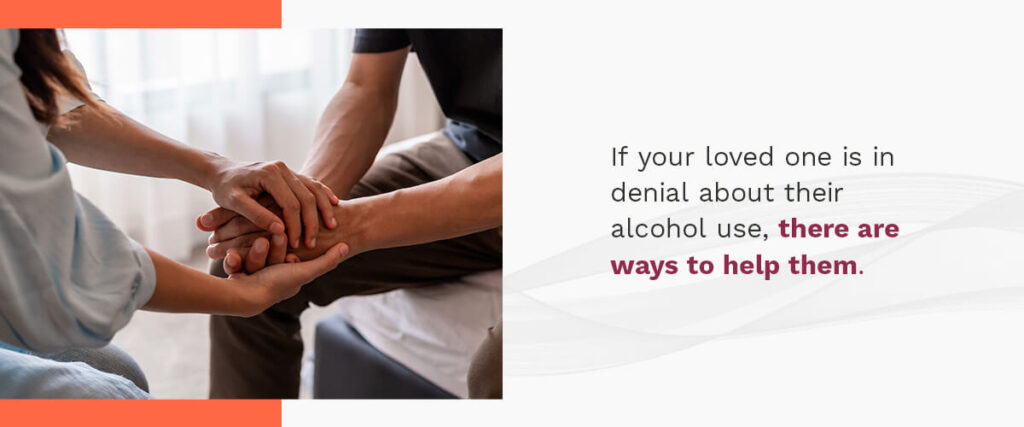How to Talk to an Alcoholic in Denial
How to Talk to an Alcoholic in Denial
The first step in getting addiction support is admitting you have a problem. However, some people are in denial about their addiction and don't believe they have a problem or that it's not as bad as it actually is. Denial can stop a person from seeking the treatment they need to improve their overall well-being.
If your loved one is struggling with alcohol addiction but is in denial about their problems, it can cause tension in your relationship and personal life. Learning how to talk to an alcoholic in denial can help encourage your loved one to get the help they need.
Why Does Addiction Cause Denial?
Denial is when someone downplays or ignores their reality and is often the result of deeper pain, such as guilt, shame, loneliness or fear of the future. When people want to suppress these uncomfortable feelings, they may turn to substances like alcohol or drugs. These substances help people ignore their feelings, and their denial can also extend to their substance use, where they may downplay the extent of their addiction or not believe it exists.
Addiction can be a vicious cycle where it helps comfort people but is also a significant problem. When people are in denial about their addiction, they will often be in denial about their substance use becomes impossible to ignore. While someone is trying to protect themselves from their uncomfortable feelings, turning to substances and addiction can cause more destruction than ever, and not just for themselves. Addiction affects everyone involved in a person's life, causing tension and grief for families and loved ones.
While denial can be a temporary way to deal with a traumatic or stressful situation, it can be harmful in the long run since it will prevent someone from addressing the root of the problem or seeking help. Turning to alcohol often deepens a person's denial. Some signs that your loved one may be struggling with denial include:
- Comparing their alcohol use with others, saying they're not as bad as others.
- Rationalizing that they need alcohol after a long day or stressful event.
- Blaming other people in their life for their problems.
- Minimizing their alcohol use because they believe they can still take care of their responsibilities.
6 Tips to Talk to Someone in Denial
If your loved one is in denial about their alcohol use, there are ways to help them. Below are some tips to help you learn how to help an alcoholic in denial:
1. Use "I" Statements
When talking to someone in denial about their alcohol use, you want to stick with "I" statements instead of "you." Using "you" statements can make a person feel like you're blaming them for what's gone wrong in their life, making them resistant to getting help. Instead, you should use "I" statements to talk about how their alcohol use has affected you and your relationship with your loved one, making it easier for them to understand the impact their alcohol use has had on the people around them.
2. Be Prepared for Negative Reactions
When you confront someone about their addiction, they may not react as expected. They may react negatively when faced with the reality of their situation, especially if they're in denial. It's essential to remember that your loved one is just trying to protect themselves from their negative experiences. If you're met with an adverse reaction, try not to take it personally. You can also take some time if emotions start to run high and reapproach the situation at another time.
3. Remind Them You're on Their Side
Many people confronted about their alcohol addiction may feel isolated or like they're being judged or targeted. You'll want to remind them that you're on their side and not against them. You should reiterate that you're here to support them through their addiction, and you can even offer them options, such as treatment programs that can help them address their underlying emotions and addiction.
4. Be Clear and Concise
You'll want to have a plan when you approach your loved one. Know what points you want to address so the conversation doesn't devolve into anger or other negative emotions. When you find out what topics you want to discuss, be clear and concise so your loved one understands what you're saying. You should also ensure that you listen carefully when your loved one responds, which will help them feel more supported and understood.
5. Stay on Track
It's also essential to stay on track when talking to your loved one in denial. If you let the conversation devolve, it can quickly turn away from getting your loved one help to something entirely different. Come prepared with your main points and stay on topic to communicate your feelings and concern. You should also come prepared with the following steps, such as encouraging your loved one to seek treatment and helping them to do so.
6. Utilize Support
If your loved one doesn't listen to you, it's best not to push. Instead, take a break from the conversation, find a second person who agrees with you and try again. However, you want to make sure your loved one doesn't feel like they're being cornered.
Remember to approach the conversation with empathy and keep in mind that your loved one is going through challenges in their life that are contributing to their addiction. If your loved one sees that multiple people care and are concerned about their well-being, they'll be more likely to listen and want to seek support with your help.
I've Talked to My Loved One and They Won't Listen. What's Next?
If you're loved one isn't listening to you, it can be challenging to deal with. Unfortunately, people have to choose to recognize their problems and seek help themselves. You can't do this for them, even if you want to.
However, you can continue to show your loved one compassion while telling them the truth. You can be empathetic toward their challenges while being honest about the severity of their addiction and how it's affecting their life and your relationship. You can continue to recommend resources and offer to go with them or support them however possible. You can find addiction programs near you and encourage your loved one to go.
Additionally, you want to ensure you're not supporting your loved one's addiction in any way. You shouldn't drink around them or do anything that may encourage addictive behaviors. You'll want to be clear that you don't support their drinking while still supporting them in other ways.
Contact Transformations By The Gulf to Start Healing Today
If you're loved one is struggling with alcohol addiction, Transformation By The Gulf can help. We are a substance abuse treatment center in St. Pete Beach, Florida. Your loved one can heal in a unique setting with traditional therapies and holistic practices to help your loved one receive comprehensive healing treatment.
Our programs are designed around biological, psychological, social, family and gender-specific needs since everyone's addiction is unique. Our treatments can help your loved one lead a productive, fulfilling and sober life. Contact us now to learn more about our programs and how we can help!
If you or someone you know would like to know more about Transformations by the Gulf Substance Abuse Treatment Center Give us a Call 24/7 (727)498-6498
The success of a person’s recovery depends on the level of personalized treatment provided. It is important to find an addiction treatment program that works. When we say our treatment is individualized, we mean that we craft a program that is tailored to address the client’s unique physical, mental and emotional needs.
In the client’s first 24 hours with us, we’ll evaluate their current state and work to understand what challenges they need to overcome. They’ll also have an initial session with our doctor and meet with one of our licensed mental health professionals.
After the initial evaluations, we’ll design a treatment plan with the sole mission of helping the client overcome and heal from addiction. Their program will focus on things such as:
- Addressing and Identifying root causes of addiction.
- Creating a support system.
- Developing healthy stress management techniques.
- Eliminating Substance use.
- Learning how to communicate emotions effectively.
- Maintaining a healthier lifestyle.
- Repairing damaged relationships.
Are you struggling with addiction and want to learn more? Visit Psychology Today or check out or page on addiction treatments.
Our Facility is near the beach and offers a comfortable setting for substance abuse treatment and recovery.
What a Day is Like in Our Treatment Facility.
Why Transformations by the Gulf?


